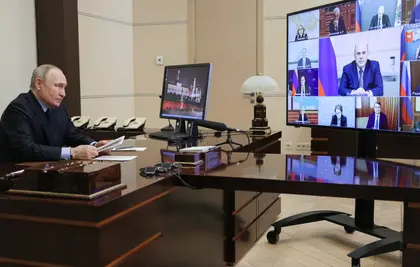On Mar. 31, President Putin and Foreign Minister Sergei Lavrov presented a new Russian Foreign Policy Concept to the Russian Security Council, in an update of the 2016 version.
As in recent times, Putin did not meet with his Security Council in person, raising speculation that he fears one of them would take the opportunity to harm him. Instead, he sat in front of a video screen in a bunker, supposedly in the Kremlin, but it could be anywhere. Putin seemed nervous and uncomfortable, toying with his papers and moving around on his chair.
JOIN US ON TELEGRAM
Follow our coverage of the war on the @Kyivpost_official.
When, a deadpan Lavrov made the public announcement of the concept, he claimed it had been devised by his Ministry for Foreign Affairs (MFA). In reality the MFA has no influence on Russian foreign policy, nor does it pursue any diplomacy but only is merely a mouthpiece for agitation and propaganda. We may wonder, therefore, if this concept has any real meaning.
With close examination, we can see the concept is very Soviet in its bureaucratic language and content. It barely approaches anything close to reality: “Russia's foreign policy is peaceful, open, predictable, consistent, pragmatic, based on respect for the universally recognized principles and norms of international law and the desire for equal international cooperation in order to solve common problems and promote common interests.”
The self-serving lies are truly shameless: “Russia consistently advocates strengthening the legal foundations of international relations and conscientiously fulfills its international legal obligations.” So how does it justify its involvement in so many recent wars?

Russia Tries to Sabotage Moldova’s European Ambitions as It Did for Georgia and Belarus
The Kremlin’s lies continue: “Russia recognizes and guarantees the rights and freedoms of men and citizens in accordance with the universally recognized principles and norms of international law.” Why are there so many political prisoners in Russia and why does its forces commit tens of thousands of war crimes?
Yet, if we “read between the lines” this document reveals much. Current Russian foreign policy is all about Ukraine, but it is only mentioned once and in passing.
The purported strengthening of Russia as a leading center of development in the modern world while it claims its independent foreign policy is perceived as a “threat to the Western hegemony of the United States of America (USA) and its satellites.” The West, in turn, uses “measures taken by the Russian Federation to protect its vital interests in the case of Ukraine as a pretext to exacerbate a long-term anti-Russian policy … It aims to weaken Russia in every possible way, undermining its creative civilizational role, power, economic and technological capabilities, limiting its sovereignty in foreign and domestic policy, and destroying its territorial integrity.”
In no way does the concept suggest that Russia has used force against anybody. On the contrary, it refers repeatedly to Article 51 of the UN Charter, which states: “Nothing in the present Charter shall impair the inherent right of individual for collective self-defense if an armed attack occurs against a Member of the United Nations…”
Needless to say, Russia does not acknowledge that it has attacked Ukraine. The concept never discusses a war of aggression. It coyly states: “In response to the unfriendly actions of the West, Russia intends to defend its right to existence and free development by all available means.” Sanctions are perceived as particularly pernicious, suggesting they have no useful purpose.
Just as Lavrov stated to great laughter at a recent conference in New Delhi, the concept claims: “It was not the choice of the Russian Federation [to invade Ukraine]. Russia does not consider itself an enemy of the West”.
Russia considers its fight not to be with Ukraine, but with the US in a war against Western hegemony. The enemy is “the USA and other Anglo-Saxon states,” which includes the United Kingdom, Canada, Australia and New Zealand - none of whom is mentioned by name.
Europe is perceived as hostile too: “Most European states are pursuing an aggressive policy towards Russia, aimed at creating threats to the security and sovereignty of the Russian Federation …” A novel stance is that, now, it is not only NATO but also the European Union and the Council of Europe, of which Russia was a member until 2022, who are declared “unfriendly.”
The current standard Russian characterization of “a collective West” is only mentioned once; as if the Kremlin still hopes to split the US, the UK, and Canada from the EU. No specific EU country is being singled out.
But who does the Kremlin see as its friends? The section on “the Near Abroad” appears particularly intimidating: “Most importantly for the security, stability, territorial integrity and socio-economic development of Russia, strengthening its position as one of the influential sovereign centers of world development and civilization, are the provision of sustainable long-term good neighborly relations and the pooling of potentials in various fields with CIS member states and other neighboring states associated with Russia by centuries-old traditions of joint statehood, deep interdependence in various fields, a common language and close cultures.”
The concept expresses clear support for only three territories: Belarus, Abkhazia, and South Ossetia. The other former Soviet republics are not even mentioned and their sovereignty is not recognized. Rather, the concept calls for further integration within the Commonwealth of Independent States, the Eurasian Economic Union and the Collective Security Treaty Organization. Good luck with that!
Especially concerning is the wording that “to further transform the near abroad into a zone of peace, good neighborliness, sustainable development and prosperity, the Russian Federation intends to give priority attention to…ensuring stability in the near abroad, including stopping the instigation of ‘color revolutions’ and other attempts to interfere in the internal affairs of Russia's allies and partners.” The Kremlin could as well state openly: If you don’t obey us, we will invade you!
This concept of Russian foreign policy shows that it makes no sense to try to talk to the current Kremlin regime. It would be better for us to wait until it is gone! Remember that Ronald Reagan did not talk with any Soviet leaders from his accession, in January 1981, until he met with Mikhail Gorbachev in October 1985.
Anders Åslund is co-author with Andrius Kubilius of the book “Reconstruction, Reform and EU Accession for Ukraine.
The views expressed in this opinion article are the author’s and not necessarily those of Kyiv Post.
You can also highlight the text and press Ctrl + Enter






